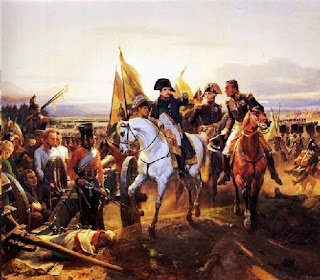What I do have is a bit of amazement that my campaign plan actually came together more or less intact. That, I would not have predicted.
I do think that the course of the campaign illustrated how important the principle of Simplicity is in war plans. It's among the principles of War of a very good reason. Wargames, in general, do not do justice to all of the principles of war equally. Instead they tend to overestimate the impact of some while leaving some others neglected -- to the detriment of those who want to use their wargames to better understand the real thing.
In particular, I think wargames generally do a poor job with Simplicity, Security and Unity of Command and its only when you take part in a large multi-player game like Harvey's that you get an inkling of how important those principle can be. The kind of gamer who likes wargames is often the sort of person who likes intricacy and details and is therefore perhaps a little less likely to undertsand the virtues of a simple plan. Indeed, I think we all know players who glory in coming up with very complicated plans. And in wargames sometimes they will work!
Less so in real life and in this campaign I think it can't be emphasized how important it was to the eventual French victory that the initial plan was simple. It could be described in a few words -- feint left, move right.
Still, at the end of the day, the overall commander's influence over events is limited and its up to the subordinates to carry out the plans and here, I think, I was very lucky. Before the Great Reveal I told Harvey that I thought all the subordinate commanders seemed to have done well, as far as I could see. Now that I've seen the whole story, my opinion is strengthened. While I might not have approved every single minor move, I see no big errors and overall I see a lot that was extremely praiseworthy. For the most part all the marshals showed flexibility of mind, commendable initiative and yet exclleent adherence to orders and the campaign plan.
Of the right corps commanders, all performed excellently, and it is really hard to single out individuals from among such an august group,
Marshals Murat, Ney and Soult did extremely well finding and fixing the enemy, often fighting successfully while outnumbered. Marshals Augerau, Bernadotte and Bessieres all landed powerful offensive blows that shattered their opponents.
But two of the marshals, I think , even managed to rise to heights worthy of special recognition.
The first of these is Marshal Davout, who executed lengthy marches with skill and occupied the single most exposed position of the campaign and held his ground against all comers. His steadfast defense of his position provided the fulcrum which leveraged all the power of the French army into an irresistible force.
So, in recognition of Marshal Davout's critical contribution to the overall victory, the Emperor Napoleon awards him the honor of Duc de Zeitz, named after the site of his exceptional stand.
 |
| Tom Thorenson aka Davout, Maréchal de France, Duc de Zeitz |
Marshal Davout is an extremely hard act to top, but the performance of his colleague, Lannes, was even more remarkable. Lannes fought a battle at Gotha, disengaged from that battle, forced marched across the entire theater, fought and won another battle at Jena and then turned around and fought yet a third battle, also at Jena, that stymied the last best chance of the Prussians to salvage a victory.
His handling of his corps will be studied as an example of the operational art for generations to come. It might compare to the Valley Campaign of Thomas "Stonewall" Jackson, but that would be anachronistic, as
Jackson won't be born for another 18 years!!
So to honor Lannes, the Emperor Napoleon names him the Duc de Jena, which he is entitled to flaunt at local wargame clubs for the rest of his days.
 |
| Paul Fish, aka Lannes, Maréchal de France, Duc de Jena |





























